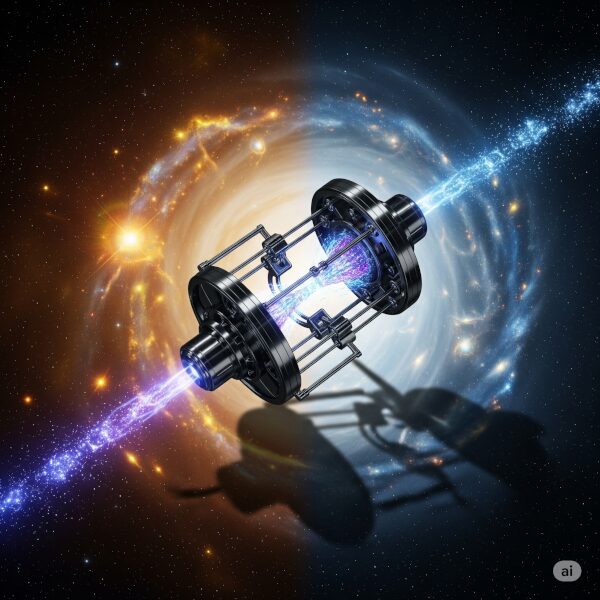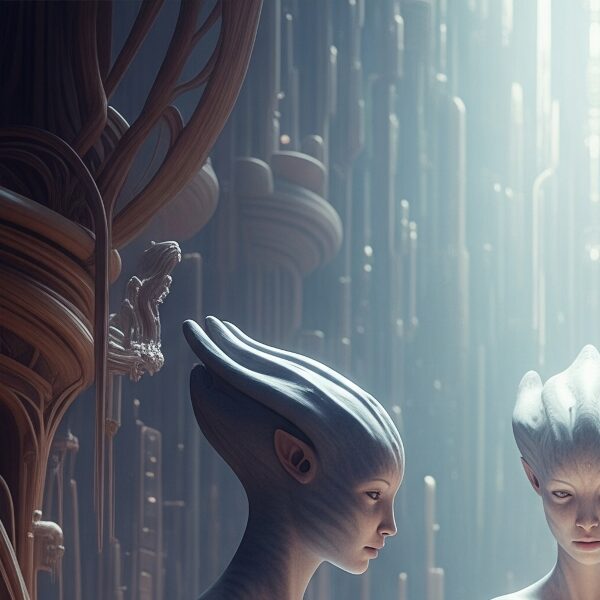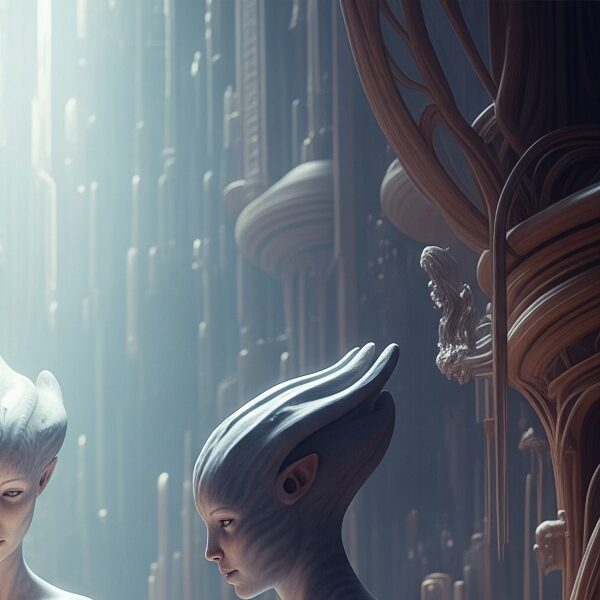The Gods Themselves Asimov
Discover Isaac Asimov’s “The Gods Themselves Asimov,” a Hugo and Nebula Award-winning novel exploring parallel universes, alien life, and the profound consequences of humanity’s pursuit of limitless energy.
Introduction
- Introduction
- Section 1: For the Uninitiated: A Gentle Dip into the Cosmic Pool
- Section 2: For Those with a Modicum of Sci-Fi Acumen: A Rather Uncomfortable Truth
- Section 3: For the Discerning Sci-Fi Aficionado: A Deep Dive into the Unfamiliar
- Major Works: The Legacy of a Visionary
- Conclusion
- The Left Hand of Darkness: Androgynus Vita (Androgynous Life)
and the Quest for Diverse Existence and Harmonious Coexistence
Ah, “The Gods Themselves.” A rather intriguing title, wouldn’t you agree? It hints at grand themes, doesn’t it? Indeed, Isaac Asimov, that grandmaster of science fiction, certainly delivered a masterpiece with this one. Published in 1972, this novel sweeps across three distinct narratives, each offering a unique lens through which to examine a truly universal dilemma. It’s a story about a seemingly miraculous invention—the “Electron Pump”—that offers humanity limitless, clean energy by exchanging matter with a parallel universe. Sounds rather wonderful, doesn’t it? But, as with all things that seem too good to be true, there’s a catch. A rather catastrophic one, in fact. Asimov, with his characteristic blend of scientific rigour and astute observation of human nature, explores the profound implications of such a discovery, delving into the potential for both unprecedented progress and unimaginable disaster. It’s a tale of scientific ambition, interdimensional diplomacy, and the stubborn persistence of folly, all wrapped up in a package that earned both the Hugo and Nebula Awards. Quite the pedigree, if I do say so myself.
Section 1: For the Uninitiated: A Gentle Dip into the Cosmic Pool
Now, if the mere mention of “parallel universes” and “Electron Pumps” sends a shiver down your spine, fear not. Think of it this way: imagine you’ve discovered a magical tap that provides endless, free champagne. Marvellous! Everyone’s delighted, celebrations abound, and all your energy worries simply fizz away. That’s essentially the human predicament in “The Gods Themselves.” This “Electron Pump” is their magical tap, seemingly solving all their energy woes by exchanging particles with a neighbouring universe.
But, as any seasoned host will tell you, even endless champagne can have unforeseen consequences. Perhaps the tap is subtly siphoning off the very structural integrity of your house, or perhaps the other universe, from which this liquid delight springs, is experiencing rather inconvenient seismic activity as a result. Suddenly, our delightful metaphor becomes a tad more unsettling, doesn’t it? Asimov, with his usual understated brilliance, takes this seemingly benign concept and gently—or perhaps not so gently—unravels the catastrophic implications. It’s a story that reminds us that there’s rarely such a thing as a free lunch, especially when interdimensional physics is involved. And it’s all told with a charming wit that makes even the most complex scientific principles feel, dare I say, almost approachable.

Section 2: For Those with a Modicum of Sci-Fi Acumen: A Rather Uncomfortable Truth
Right, then, for those of you who’ve dabbled in the delights of speculative fiction, let’s cast aside the gentle pleasantries. “The Gods Themselves” isn’t merely a cautionary tale; it’s a scathing indictment, cloaked in a veneer of scientific grandeur. Humanity, ever so eager for a quick fix, embraces the Electron Pump with a zeal that borders on the ludicrous. “Free energy!” they cry, conveniently ignoring the whispers of a few eccentric scientists who suggest, ever so politely, that perhaps—just perhaps—this interdimensional exchange might lead to the sun going supernova. A minor detail, apparently, when limitless power is on the table.
And then there are the “Soft Ones,” the truly alien beings from the parallel universe. Asimov dares to create creatures so utterly unlike us, with their three genders, their “melting” for reproduction, and their society built on emotional and rational triads. Yet, even they are not immune to the self-serving myopia that seems to plague intelligent life across dimensions. Their desperation for their own sun’s survival blinds many to the threat they pose to ours. It’s a rather cynical, perhaps even blackly humorous, look at how quickly convenience can trump responsibility, and how even the gods themselves, or at least beings of vastly superior intellect, can contend in vain against sheer, unadulterated stupidity. One might even deduce that a regular dose of science fiction helps to keep one’s cynicism finely honed, and perhaps, just perhaps, makes one a tad more prepared for the absurdities of reality. No pressure, of course.

Section 3: For the Discerning Sci-Fi Aficionado: A Deep Dive into the Unfamiliar
Now, for those of you who truly appreciate the intricate gears and cogs of a well-crafted speculative narrative, “The Gods Themselves” offers a feast. Asimov doesn’t shy away from the hard science, meticulously crafting a universe where the strong and weak nuclear forces operate differently, allowing for the stable decay of plutonium-186 and, consequently, the dangerous energy exchange. The ingenious concept of the “inter-universe” and the thermodynamic implications of the Electron Pump are a masterclass in theoretical physics woven into compelling narrative.
But beyond the physics, the novel shines in its exploration of truly alien sociology and biology. The “Soft Ones” are not merely humans in funny suits; their triadic relationships, their unique reproductive cycle, and the very structure of their thought processes (Parental, Emotional, Rational) are genuinely thought-provoking. The middle section, told from their perspective, is a brave and successful attempt to portray consciousness fundamentally different from our own. Asimov uses these distinct viewpoints to critique human arrogance, scientific hubris, and the insidious nature of political inertia. It’s a nuanced examination of how conflicting self-interests, even when well-intentioned, can lead to universal catastrophe. And, as any true fan knows, it’s these profound questions, nestled within thrilling narratives, that truly elevate science fiction beyond mere entertainment. One might even discover a renewed appreciation for the complex dance of universal forces, and perhaps, even a glimmer of hope that intelligence, no matter how flawed, might occasionally contend successfully.

Major Works: The Legacy of a Visionary
Should “The Gods Themselves” ignite a spark of curiosity within your intellectual soul, you’ll be pleased to know that Isaac Asimov’s bibliography is vast and brimming with other treasures. He truly was a titan of the genre, known for his prolific output and insightful narratives. Some of his most celebrated contributions include:
- The Foundation Series: A sprawling saga exploring the fall and rebirth of a galactic empire, guided by the principles of “psychohistory.” This series, including Foundation, Foundation and Empire, and Second Foundation, is a cornerstone of science fiction.
- The Robot Series: Beginning with I, Robot, these stories delve into the complexities of artificial intelligence and introduced his famous Three Laws of Robotics, which have influenced real-world robotics and ethical discussions for decades. Titles like The Caves of Steel and The Naked Sun blend detective fiction with science fiction, starring human detective Elijah Baley and his robot partner, R. Daneel Olivaw.
- Nightfall: Often considered one of the greatest science fiction short stories of all time, exploring the psychological and societal impact of a multi-sun system where night, and thus stars, are a rarity.
- The End of Eternity: A standalone novel exploring time travel and its profound implications for humanity’s future.
These works, among many others, showcase Asimov’s incredible foresight, his mastery of scientific concepts, and his enduring fascination with the human condition.
Conclusion
So, there you have it, a journey through the rather brilliant, albeit slightly unsettling, universe of Isaac Asimov’s “The Gods Themselves.” It’s a novel that, with gentle humour and a dash of sharp observation, reminds us of the precarious balance between progress and peril, and the rather inconvenient truth that even the most well-intentioned advancements can have unforeseen, and quite frankly, terrifying consequences. Whether you’re a seasoned traveller of the cosmos or merely dipping a tentative toe into the wondrous waters of science fiction, this book offers a compelling narrative that is both intellectually stimulating and thoroughly enjoyable. Do give it a read; you might find yourself pondering the true cost of convenience, and perhaps, even chuckle at the sheer audacity of human (and alien) folly. After all, a little introspection, perhaps sparked by a grand tale of interdimensional physics, never hurt anyone.

The Left Hand of Darkness: Androgynus Vita (Androgynous Life)
and the Quest for Diverse Existence and Harmonious Coexistence
Related Articles
-
Vonda N. McIntyre DREAMSNAKE: Why This Is an Essential Read!

Vonda N. McIntyre DREAMSNAKE, an award-winning novel, explores a healer’s perilous journey across a transformed, post-apocalyptic Earth with sentient snakes. Discover this feminist sci-fi classic.
-
Unravelling the Threads of Middle-earth: The Lord of the Rings’ Enduring Legacy

Lord of the Rings enduring legacy continues. Explore Tolkien’s fantasy epic, its profound allegories, and lasting impact on literature.



Leave a Reply